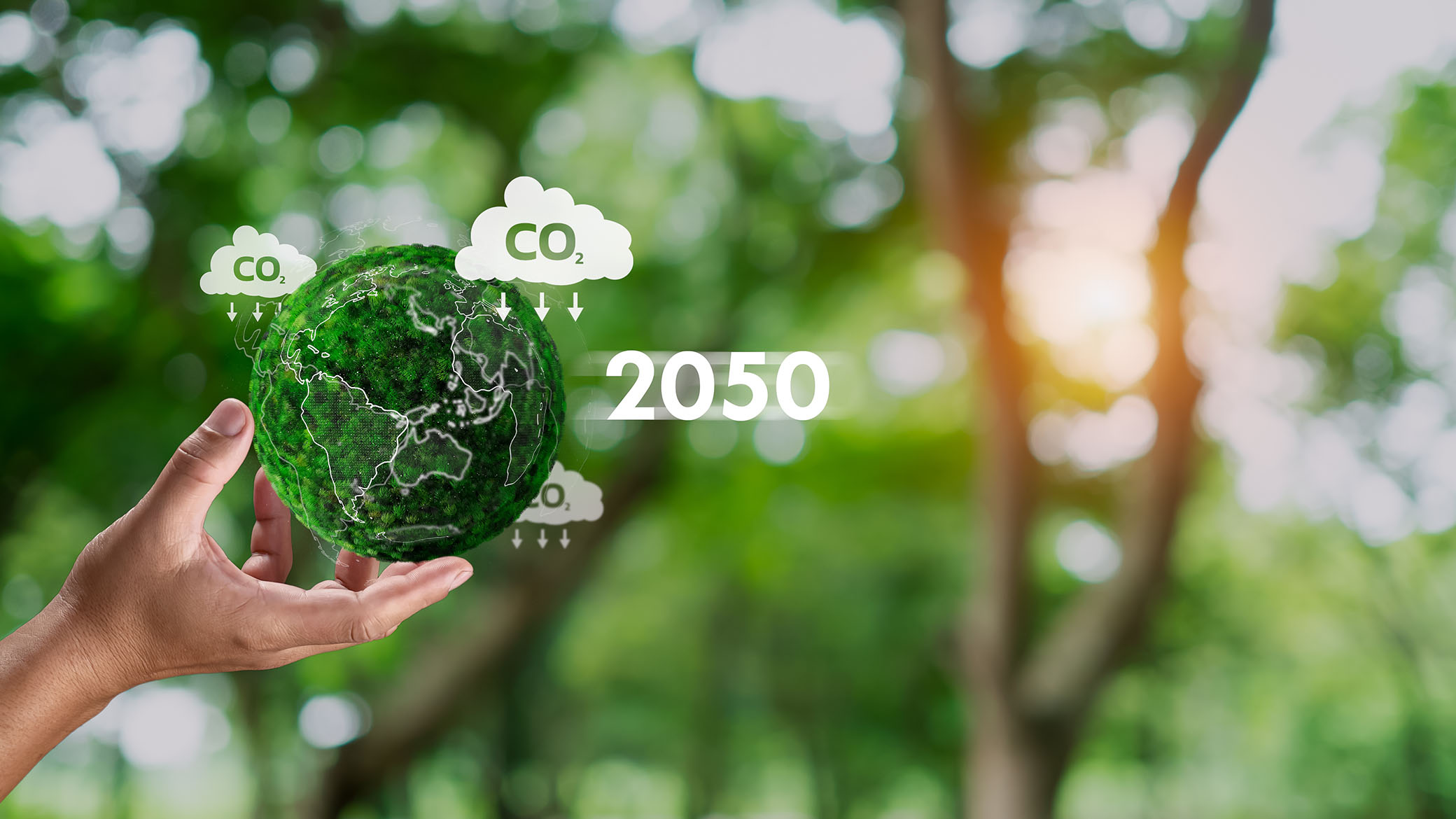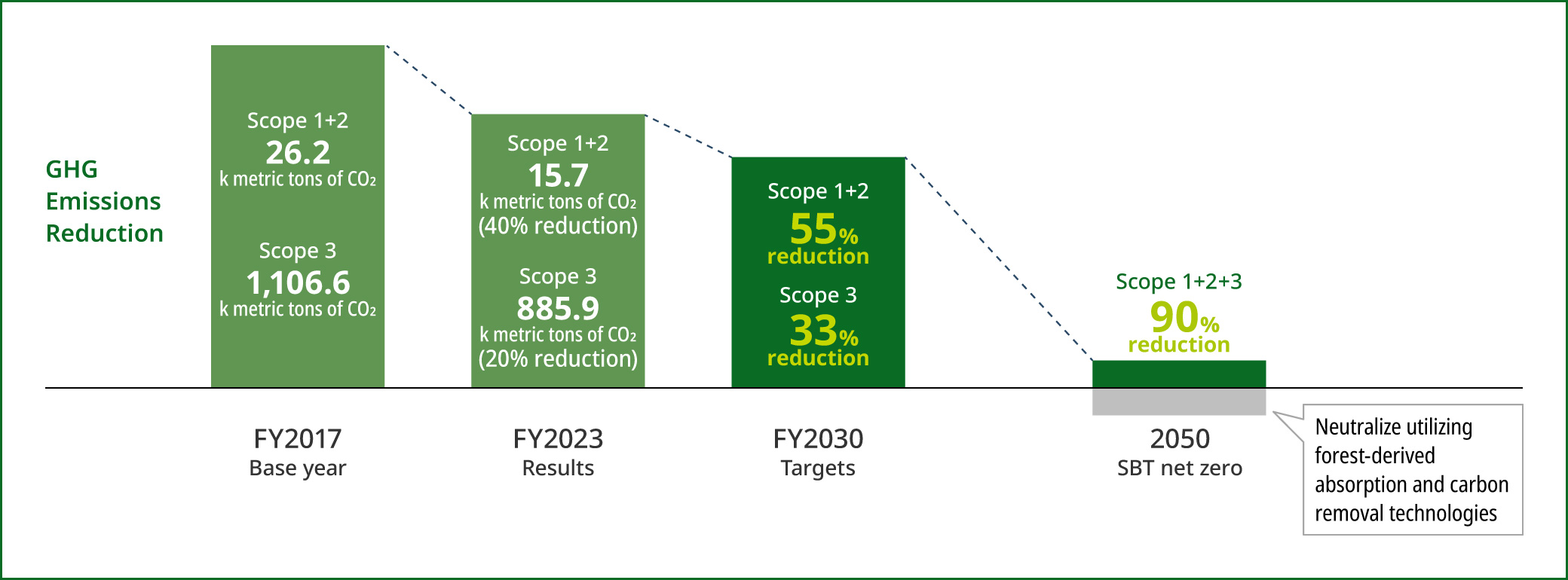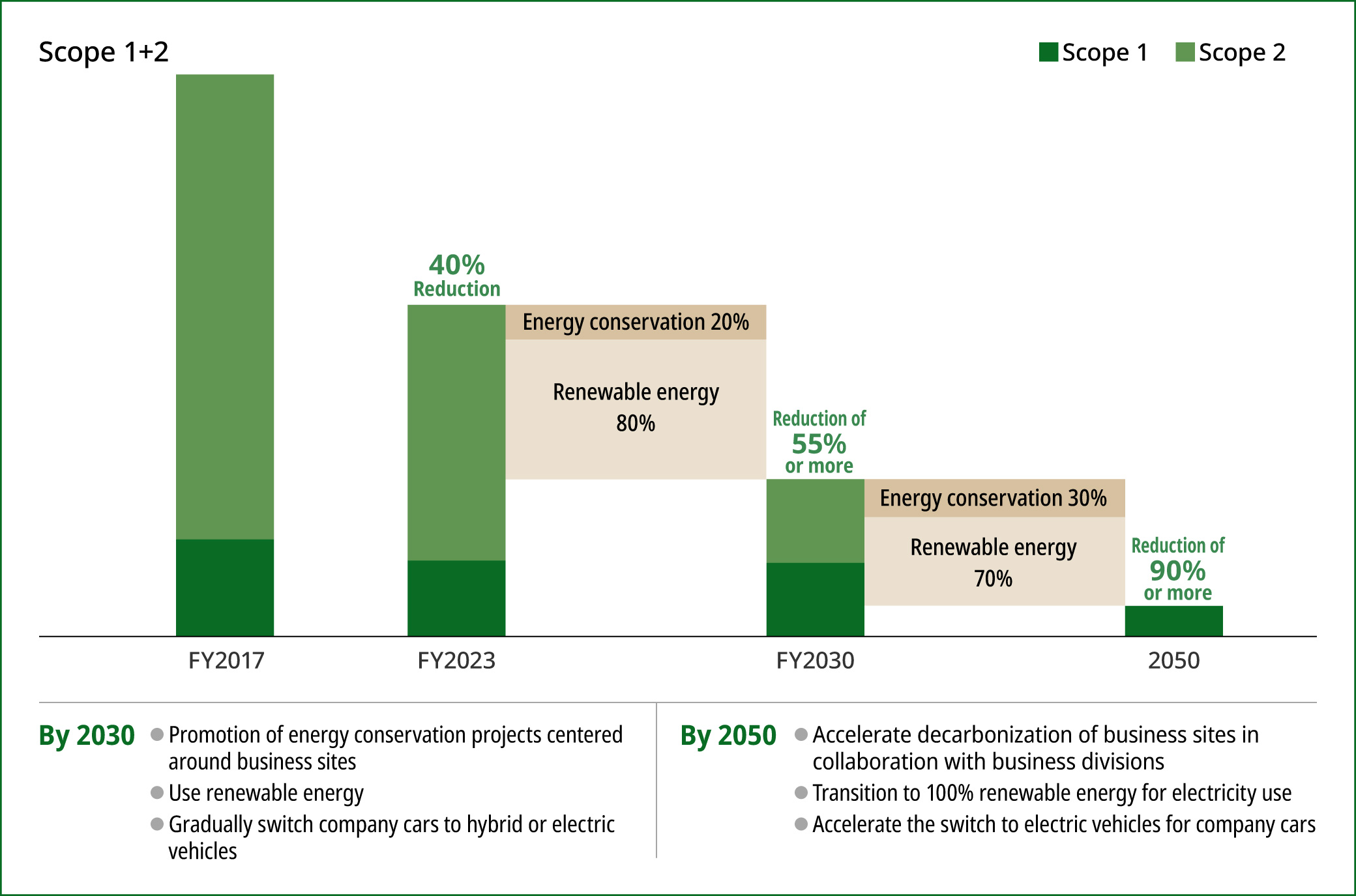with azbil
azbil MIND
Achieving 100% renewable energy procurement at azbil Group sites

Toward net-zero greenhouse gas emissions by 2050:
Approaching from both energy conservation and renewable energy perspectives
The azbil Group has set a goal of reducing greenhouse gas emissions from its business activities by 55% compared to fiscal 2017 levels, with a view to achieving net-zero greenhouse gas emissions by 2050. We are promoting energy-saving initiatives and the use of renewable energy. At azbil Group’s factories and facilities, we utilize our energy-saving technologies, and we cover essentially 100% of the electricity purchased at the Shonan Factory and Fujisawa Technology Center in Kanagawa Prefecture, Japan with renewable energy. As a result, the azbil Group is making significant progress toward achieving net-zero emissions.
Declared the 1.5°C target and obtained re-certification by the SBTi in 2021, achieving net-zero certification in 2024
Measures to combat global warming have become so urgent that the situation is now referred to as a climate crisis. The Paris Agreement, an international framework for combating global warming beyond 2020, sets the goal of “keeping the increase in the global average temperature to well below 2°C compared to pre-industrial levels (2°C target) while pursuing efforts to limit it to 1.5°C (1.5°C target).” In 2019, the azbil Group declared its commitment to the 2°C target and was recognized for having scientifically-based targets to achieve it, earning certification from the Science Based Targets initiative*1 (SBTi). In 2020, the Japanese government declared its commitment to achieving carbon neutrality, aiming to reduce greenhouse gas*2² (GHG) emissions to essentially net zero by 2050. In the same year, the azbil Group formulated its “2050 Long-Term Vision for Reducing Greenhouse Gas Emissions,” aiming to achieve net-zero GHG emissions (Scope*3 1+2) from its business activities by 2050, and declared its commitment to realizing carbon neutrality. Subsequently, the Intergovernmental Panel on Climate Change (IPCC) reported the importance of the 1.5°C target, as it is projected that the temperature could rise by 1.5°C compared to pre-industrial levels as early as 2030. In response to this, in 2021, the azbil Group revised its 2030 reduction target for GHG emissions from its business activities, increasing it from a 30% reduction based on 2013 standards to a 55% reduction based on 2017 standards. This target has been re-certified by the SBTi as consistent with the level required to limit the temperature rise to below 1.5°C compared to pre-industrial levels. Furthermore, in 2024, as part of a new long-term vision, the azbil Group set a goal to achieve net zero by reducing GHG emissions across the entire value chain (Scope 1+2+3) by more than 90% compared to fiscal 2017 standards. Additionally, the reduction target for Scope 3 emissions in the supply chain was increased from the previous 20% to 33%, based on fiscal 2017 standards. As a result, in October 2024, the azbil Group obtained SBT Net-Zero certification.

Introduce in-house technologies to advance energy conservation
The key to specific measures to reduce GHG emissions is the promotion of energy conservation. In the azbil Group, the Building Automation (BA) business in the building sector and the Advanced Automation (AA) business in the industrial sector collaborate with the environmental promotion and technology development departments. Together, they form cross-organizational projects to plan and implement energy conservation measures.
In the azbil Group, both the BA business and the AA business provide products and services that support customers’ energy conservation. Consequently, the group can utilize its energy-saving technologies and expertise for its own activities. For example, Building 104, the new laboratory building at the Fujisawa Technology Center, Azbil Corporation’s development base that began operations in September 2022, houses standard rooms and clean rooms designed to maintain the accuracy of various measuring instruments. As a result, it consumes a significant amount of energy. Here, energy-saving measures that leverage the expertise of the BA business are implemented, such as achieving high-precision air conditioning control while minimizing energy consumption. Additionally, the five factories operated by Azbil Kimmon Co., Ltd. account for about 20% of the azbil Group's total energy consumption. Energy-saving technologies from the AA business are being utilized to enhance the operation of their utility equipment. Furthermore, the BA and AA businesses apply the energy visualization systems they provide to customers within the azbil Group, making the energy consumption trends of the entire group visible to employees. This effort is part of a broader initiative to promote energy conservation through both operational and equipment improvements.
In this way, we are steadily making progress toward achieving our goal of reducing GHG emissions from our own business activities.
Through the procurement of renewable energy, we expect to achieve over 60% renewable energy usage for the entire group
Reducing CO2 emissions fundamentally requires energy conservation by reducing energy usage itself, but to achieve further reductions, the introduction of renewable energy is necessary. In the azbil Group, electricity accounts for 80% of the total energy usage, so we considered the introduction of renewable energy to be essential. In 2022, we began sourcing 100% of the electricity used at the Shonan Factory—the mother factory in our global production system—and at the Hadano Distribution Center, located in the same prefecture, from renewable energy sources. Additionally, we have started operating solar power generation facilities at other factories within the Group and are utilizing renewable energy both domestically and overseas. For example, we have installed solar power generation facilities at Azbil Production (Thailand) Co., Ltd.
Meanwhile, electricity consumption at the Fujisawa Technology Center accounts for 24% of the azbil Group’s total, based on actual results from fiscal 2023. Therefore, in July 2024, Azbil entered into an off-site corporate PPA*4 service agreement for solar power generation with two companies that are well-versed in renewable energy within Japan. It began sourcing 100% of the electricity purchased for the Fujisawa Technology Center from effectively renewable energy. An off-site corporate PPA is a system in which a power purchase agreement is made for solar power generation facilities installed off-site. This allows the use of solar power without requiring land or initial investment.
When the renewable energy electricity procured for the Fujisawa Technology Center is combined with what has already been implemented within the azbil Group, the proportion of renewable energy in the Group’s total electricity usage is expected to exceed 60%. This represents a significant step forward in meeting the azbil Group’s target for reducing GHG emissions by 2030.

The azbil Group believes that the expertise it has developed in energy conservation and the procurement of renewable energy for its own operations can also be utilized at customer sites. We will deepen our efforts by applying the expertise gained from our own initiatives to our customers’ sites and by utilizing the insights gained at customer sites to further enhance our own decarbonization efforts. This approach aims to create a virtuous cycle that benefits both our customers and the azbil Group. Going forward, the azbil Group will continue to promote green transformation (GX) solutions that combine energy conservation and renewable energy, aiming to make contributions “in series” that lead to a sustainable society through effective efforts to address the challenges of climate change.
- *1: Science Based Targets initiative (SBTi)
An organization established in 2015 by the Carbon Disclosure Project (CDP), a consortium of institutional investors promoting disclosure on climate change actions, the World Resources Institute (WRI), the World Wide Fund for Nature (WWF), and the United Nations Global Compact (UNGC) to achieve science-based targets (SBT) for greenhouse gas emission reduction. - *2: Greenhouse gases
A general term for gases present in the atmosphere that contribute to the greenhouse effect by absorbing some of the infrared radiation emitted from the Earth’s surface. - *3: Scope
Scope 1: Direct emissions of greenhouse gases from sources that are owned or controlled by a company (e.g., fuel combustion, industrial processes)
Scope 2: Indirect emissions from the use of electricity, heat, and steam purchased from other companies
Scope 3: Other indirect emissions that occur as a consequence of a company’s activities, from sources not owned or directly controlled by the company - *4: Corporate Power Purchase Agreement (PPA)
A long-term contract in which a company purchases renewable energy electricity from a power generation company. It is attracting attention as a method for companies to procure energy that contributes to the reduction of CO2 emissions. An off-site PPA is a form of power procurement where electricity is sourced from a remote power plant via the public transmission and distribution network. - *This article was translated from the Japanese version of the article published on January 28, 2025.
 Related information
Related information
-

Our Long-Term Vision for Combatting Global Warming
-

Azbil procures certified renewable energy for 100% of the electricity purchased by the Fujisawa Technology Center
-

Azbil Receives Net-Zero Target Certification from the SBTi: On Course to Achieve Net-Zero GHG Emissions Throughout the Value Chain by 2050
